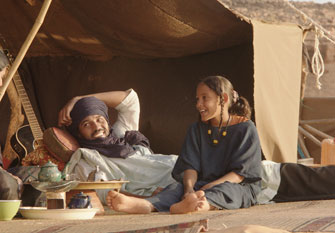
In the popular imagination, Timbuktu may represent the back of beyond, but there’s certainly a lot going on there in the eponymous new film by Mauritanian director Abderrahmane Sissako, which has been nominated for the Academy Awards Best Foreign Language Film.
In his sometimes violent yet beautiful and often lyrical movie, Sissako follows to the letter the advice given to all budding writers: show, don’t tell. He offers no context or explanation for the stories told, just dives straight into a moment in the life of this ancient city (a UNESCO World Heritage Site) in Mali, built of the sands of the Sahara and gradually being engulfed by them.
The film starts with shots of armed Islamic policemen buzzing around town on motorcycles shouting out instructions to the populace over loudspeakers: music and cigarettes are now forbidden; women must wear gloves and socks in public; etc.
The film flashes back and forth among the stories of a wide range of characters, finally focusing on the couple Kidane (played by Ibrahim Ahmed, known as Pino) and Satima (Toulou Kiki), and their little girl Toya (Layla Walet Mohamed). Many of the minor characters are seen only once or twice and seem to be there only to make a point about the absurdity and cruelty of the Sharia law imposed by the invaders.
If you know little or nothing about Timbuktu, as I confess was true in my case, you will wonder about a lot of things. Here is a quick primer that may help you make sense of it: hundreds of years ago, the now-impoverished city was a prosperous trading center and home to an Islamic university famed for its scholarship. Over the centuries, it has been conquered by many peoples, from the Tuarags to the Moroccans. Between 1893 and 1960, it was a French colony. The film covers a period in 2012 when Tuarag rebels, followed by an Al Qaeda-related Islamist group, took over the city and imposed Sharia law on its residents.
These new lawmen do not speak the local language (five languages are spoken in the film: French, Arabic, Bambara, English and Songhay), creating even greater distance between them and the locals, who do not take well to the new strictures. One of those minor characters we never get to know is a woman who sells fish in the market and dares to tell the invaders that she refuses to wear gloves while handling fish. This scene is almost lighthearted when compared to the harrowing moments later in the film when harsh justice is inflicted on individuals for such crimes as singing or adultery (the real-life stoning to death of a couple for adultery in Timbuktu was the trigger for this film).
Another minor character, the town crazy woman, who goes around singing to herself and wears a dress with a long train that trails behind her in the sand, seems to be exempt from Sharia law – no one ever orders her to wear a veil, for example. While this is not explained either, we sense that it has to do with the fear (or respect?) inspired by her otherness.
While the film is certainly an indictment of Sharia law, it does not depict all the invaders as monsters. They are individuals (or buffoons, as The New York Times put it), with their own foibles and soft spots. Although cigarettes are forbidden, for example, one of the leaders often sneaks off into the dunes to light up. “We all know you smoke,” his driver tells him wryly when he returns to his car. Others seem intelligent and humane, while some are just inept (e.g., a young man who keeps blowing his filmed statement about his commitment to jihad).
Strangely, the outcome of the main story, concerning the loving father Kidane, his unflappable wife Satima (“She has an inner strength,” says one of the translators to the Tuareg leader) and their daughter Toya, would probably not have been much different even if Sharia law hadn’t been in effect in Timbuktu.
Timbuktu is by turns horrifying, funny, tender and humane. As disjointed as it is, it is timely and full of sharp observation. Don’t miss it.
A French/Mauritanian production, the film came out in France in December and will be released in the United States in January.
Editor’s note, Feb. 21, 2015: Timbuktu won Best Film and six other awards from the French Césars and has been nominated for Best Foreign Film by the Oscars.
Favorite